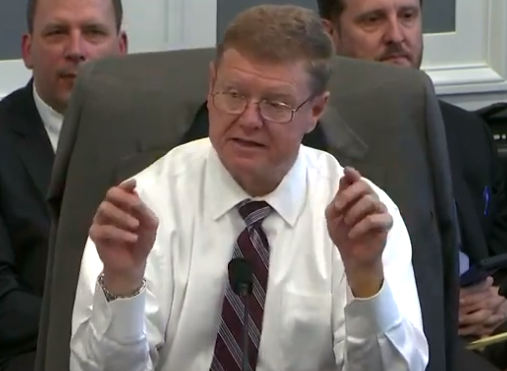FCC Pressed on Protecting Broadcasting as Critical Infrastructure

The smarter way to stay on top of broadcasting and cable industry. Sign up below
You are now subscribed
Your newsletter sign-up was successful
Rep. Mark Amodei (R-Nev.) had broadcasters' back at a Hill hearing this week, with an assist from commissioner Jessica Rosenworcel.
During questioning at a House Appropriations Financial Services and General Government Subcommittee hearing on the FCC's budget, and after much talk from legislators as well as FCC chair Ajit Pai and commissioner Rosenworcel about the importance of 5G--freeing up spectrum, streamlining tower citing--Amodei shifted to a related topic.
He said that, having talked with broadcasters in "his neck of the woods," some of that "old technology" is "kind of the doomsday infrastructure" when others fail.
He said while the government is spending time and money to make sure new 5G networks are as bulletproof as possible," at the end of the day they might not be, and there was that other, he said he didn't want to call them "rabbit ears," technology.
He said he planned to follow up with the FCC on what it was doing for that other, "doomsday" infrastructure.
Amodei said that online has great possibilities for both good and evil, but given that it was a constant target, "was there any thought [at the FCC] about saying, 'hey, wait a minute, if that goes down, we can still switch over to those folks that we took care of when we were repacking so that, if we have to, we can turn on the radio or tune to the emergency broadcast network 'old style.'"
He asked if the FCC was looking at that. Pai said "certainly we are. We share that concern," then talked about coordinating with other agencies on network security.
The smarter way to stay on top of broadcasting and cable industry. Sign up below
Related: Broadcast First Informer Role Cited at Sandy Hearing
Amodei then asked for Rosenworcel's input, after pointing out that "especially when you add the rural element into it, when push comes to shove, sometimes the only thing is that old technology sitting on the mountain top that gives you something."
Rosenworcel could have been channeling the National Association of Broadcasters (except NAB would likely argue that with ATSC 3.0, broadcasting is both old and new tech): "When we have fires in Northern California and floods in Nebraska and Hurricane Sandy, we do have to remember that most people turn to their broadcasters to learn what's going on," she said.
"And when the power goes out," she added, "your phones are hard to charge. We have to be mindful that a radio with batteries may feel awfully old school, but it may be one of the most important things we have around."
Rosenworcel said the FCC had to make sure it protects such "old school" but vital technology.
Contributing editor John Eggerton has been an editor and/or writer on media regulation, legislation and policy for over four decades, including covering the FCC, FTC, Congress, the major media trade associations, and the federal courts. In addition to Multichannel News and Broadcasting + Cable, his work has appeared in Radio World, TV Technology, TV Fax, This Week in Consumer Electronics, Variety and the Encyclopedia Britannica.

